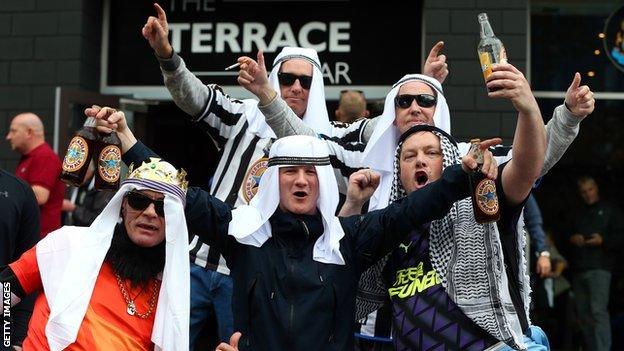Newcastle: Premier League clubs vote to block sponsorship deals linked to owners
- Published

Newcastle fans lined the streets outside St James' Park before kick-off
Premier League clubs have voted to temporarily block teams agreeing lucrative sponsorship deals linked to a club's owners after the Saudi Arabia-backed £305m takeover of Newcastle.
Eighteen clubs voted in favour of the ban at an emergency meeting on Monday.
Newcastle voted against and Manchester City abstained, with both questioning the legality of the move.
It means a temporary one-month ban on deals linked to club owners while the issue is debated further.
That prevents Newcastle signing sponsorship deals with companies linked to Saudi Arabia's Public Investment Fund (PIF), which owns 80% of the club.
Top-flight teams complained to the league after the Newcastle takeover was completed on 7 October because of frustration about how the deal passed the owners' and directors' test.
Last week, Leeds owner Andrea Radrizzani said Financial Fair Play (FFP) rules must be enforced around the takeover to ensure the 20 Premier League clubs are "playing the same game".
Premier League FFP rules allow clubs to make maximum losses of £105m over a rolling three-year period.
The league said it approved the takeover after receiving "legally binding assurances" that the Saudi state would not control the club.
The PIF, which will provide 80% of funds for the deal, is seen as separate to the state.
This is despite the Crown Prince of Saudi Arabia, Mohammed bin Salman, being listed as chair of PIF.
PIF has assets of £250bn, making Newcastle one of the richest clubs in the world.
Several major European clubs have sponsorship deals linked to their owners.
Manchester City's stadium, training complex and shirts are sponsored by Etihad, the airline of Abu Dhabi. City's Abu Dhabi owners took control of the club in 2008.
City successfully overturned a two-year ban from European club competition for committing breaches of Financial Fair Play rules after they were cleared of all the major charges around manipulation of sponsorship deals at a Court of Arbitration for Sport appeal last year.
The Premier League's own investigation into City for breaching FFP rules has yet to reach a conclusion.
'Internal war in the Premier League'
Sports geopolitics expert Simon Chadwick on BBC Radio 5 Live
There are rules domestically and across Europe about what you can invest.
This is intended to make sure you focus on generating revenues, controlling your costs and that "financial doping" doesn't take place. In other words, when owners are ploughing money into the club and that skews competition.
The four-week ban is somewhat unusual because sponsorship deals in general typically come at the end of the season.
What I think this is a reflection of is the fact that there's an internal war taking place, an internal battle.
The Saudi Arabian takeover has been long and protracted. It's got political, it's become very, very fractious. That is rumbling on behind the scenes.
This is the other 18 clubs making a statement of objection to the Premier League and is sending a statement to the Saudi Arabian owners at Newcastle United and the Abu Dhabi owners at Manchester City, that you can't buy your way to success, there are rules, you've got to play along with the rules and if you're not going to do that then we will take action against you.
What is financial fair play?
Both European football's governing body Uefa and the Premier League have Financial Fair Play rules to avoid clubs spending beyond their means.
As part of the rules clubs need to balance football-related expenditure - transfers and wages - with income, including revenues raised by their commercial departments.
Money spent on stadiums, training facilities, youth development or community projects is exempt.
Both Uefa and the Premier League impose limits on the amount of money a club can lose over a certain period.

Our coverage of Newcastle United is bigger and better than ever before - here's everything you need to know to make sure you never miss a moment
